In the healthcare field, Electronic Medical Records (EMR) systems are revolutionizing the way patient information is managed. EMRs replace traditional paper charts with a user-friendly digital platform, providing healthcare providers with a comprehensive view of a patient’s health details in one place.
This transition simplifies data access and organization, enhancing communication between providers and improving patient engagement.
Despite the challenges of cost and training, EMRs significantly enhance the healthcare experience for both patients and providers. Let’s explore some EMR tools that make life easier for both doctor and patient.
What is an EMR System?
An Electronic Medical Record (EMR) system is a digital platform used by healthcare providers to manage patient information. It includes patient records, appointment scheduling, billing, secure communication, advanced processes, and improved care.
Benefits include increased efficiency, reduced errors, and better data security. Despite the challenges of high costs, extensive training, and privacy concerns, EMRs are essential for modernizing healthcare practices and require careful management and investment.
How do I choose an EMR system?
matches with your practice’s specific needs and goals. Here’s a step-by-step guide to help you make an informed decision:
1. Identify Your Needs: Begin by enumerating the particular requirements and objectives of your practice. Think about things like your practice’s size, the specializations you offer, and any particular needs you may have for features or workflows. This will assist you in reducing the number of systems that can satisfy these requirements.
2. Examine Your Options: Look into the many EMR systems that are on the market. Examine the features, functionality, and reputations of the vendors. To obtain information, make use of resources including industry reports, internet evaluations, and peer recommendations.
3. Examine Key Features: Compare the electronic health records, scheduling, billing, and patient engagement capabilities that are the main components of each EMR system. Make sure the system can manage particular workflows and has all the capabilities you need for your clinic.
4. Analyze Interoperability and Integration: Find out how well the EMR system works with other systems you use, such as imaging or laboratory systems. Effective processes and smooth data interchange depend on strong interoperability.
5. Think about Usability and Training: Select a system that has an easy-to-use interface that your employees can easily traverse. Verify whether the vendor provides thorough training and assistance to ensure a smooth transition for your staff to the new system.
6. Examine Security and Compliance: Make that the EMR system has strong security measures in place to safeguard patient data and conforms with all applicable laws (such as HIPAA). Check to see if the system has audit trails, access limits, and encryption.
7. Cost and Pricing Structure Analysis: Examine each EMR system’s pricing structure, taking into account one-time charges, recurring payments, and any supplemental costs for support or upgrades. Analyze the overall worth by comparing these expenses to your budget.
8. Examine Scalability: Take into account if the EMR system can grow with your practice. Make sure it can handle more patients and more features without needing to be completely redesigned.
9. Test the System: To observe the EMR system in operation, ask for a demo or trial if at all possible. This will allow you to examine the features, UI, and general functionality up close.
10. Seek References and Reviews: Contact other practices or healthcare professionals who utilize the EMR system to gather comments. Reviews and testimonials can provide information on the system’s performance and the vendor’s customer support.
11. Make an Informed Decision: Using your research, evaluations, and feedback, choose the EMR system that best meets your practice’s objectives and goals. Ensure that it strikes the appropriate balance of functionality, usability, compliance, and cost-effectiveness.
Quick Comparison of The Best EMR Systems
| EMR Tool | Capterra Rating | Pricing | Best Feature | Scheduling Features |
|---|---|---|---|---|
| Epic EMR | 4.3/5 | Custom Pricing | Comprehensive integration and scalability | Advanced scheduling with automated reminders and resource management |
| Cerner EMR | 4.2/5 | Custom Pricing | Robust clinical and operational workflows | Integrated scheduling with patient self-service options |
| Athenahealth EMR | 4.1/5 | Custom Pricing | Cloud-based flexibility and user-friendly interface | Flexible scheduling with patient portal integration |
| Allscripts EMR | 4.0/5 | Custom Pricing | Extensive interoperability and population health management | Comprehensive scheduling with advanced analytics and patient reminders |
| NextGen Healthcare EMR | 4.1/5 | Custom Pricing | Customizable for various specialties and practice sizes | Customizable scheduling tools with patient appointment reminders |
| EClinicalWorks EMR | 4.3/5 | Starting at ~$249/user/month | An integrated healthcare system with strong patient management capabilities | Integrated scheduling with automated appointment reminders and online booking |
| Kareo EMR | 4.2/5 | Custom Pricing | Easy-to-use interface tailored for small practices | Simple scheduling with easy appointment management and reminders |
| Greenway Health EMR | 4.0/5 | Custom Pricing | Customizable solutions with a focus on efficiency | Scheduling with customizable templates and patient communication tools |
| Practice Fusion EMR | 4.2/5 | Starting at ~$149/user/month | Affordable cloud-based solution with strong usability | Basic scheduling features with appointment reminders and patient self-scheduling |
| Meditech EMR | 4.1/5 | Custom Pricing | Integrated healthcare system with strong patient management capabilities | Advanced scheduling with resource management and patient notifications |
TOP 10 EMR systems
1. Epic EMR
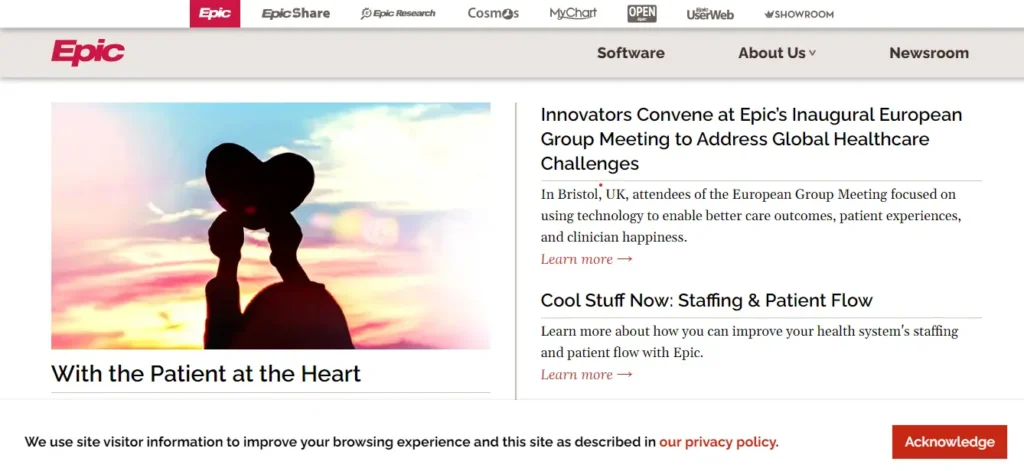
Epic helps policymakers and data producers analyze complex policy content, identify the most vulnerable groups and their key issues, and develop a comprehensive indicator framework. As a tool for healthcare providers, Epic is a powerful solution yet easy to use.
FEATURES –
- Customizable templates: Tailor documentation to fit specific workflows.
- Telehealth integration: Allows virtual patient visits within the EMR system.
- Patient portal lets patients view records, schedule appointments, and communicate with providers.
- Mobile accessibility: Provides access from mobile devices for on-the-go care.
- Integrated billing and scheduling: Manage appointments and billing within the same platform.
CONS –
- Expensive implementation and maintenance.
- Steep learning curve.
COST –
Pricing is customized based on the size of the healthcare organization.
2. Cerner EMR
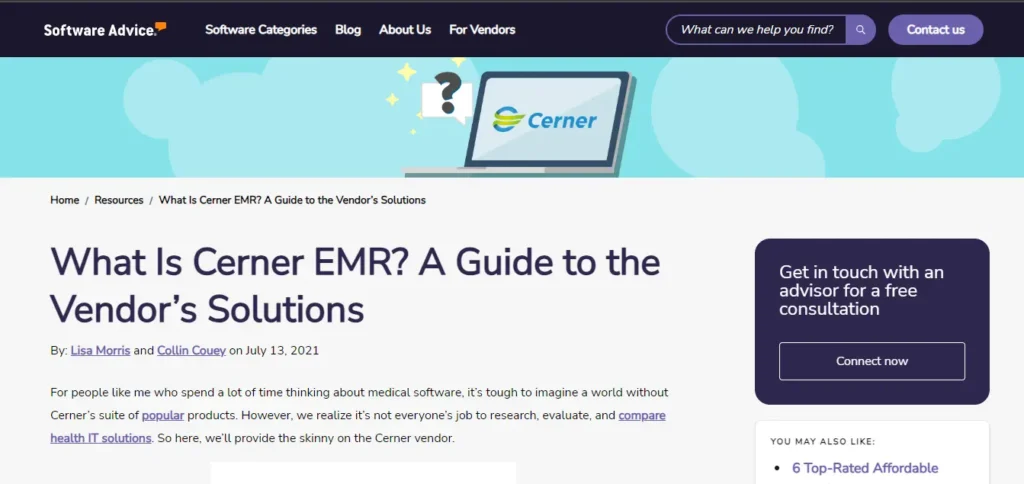
Cerner EMR is an extensive collection of medical software solutions, globally utilized by health-related institutions. It provides a variety of clinical documentation and revenue cycle management options. Also, it offers charting, documentation, revenue management, and health analytics.
FEATURES
- Real-time documentation: During consultations, automatically update patient records.
- Advanced analytics and reporting: Make smarter decisions by applying data-driven insights.
- Telehealth support: Arrange for follow-ups and consultations via remote means.
- Population health management: Monitor and assess patient populations’ health results.
- Cloud-based solutions: Safely access records from any location with internet access.
CONS –
- Exorbitant implementation expenses
- The difficulty of customizing
COST –
Costs vary, and complete deployment necessitates a substantial investment.
3. Athenahealth EMR
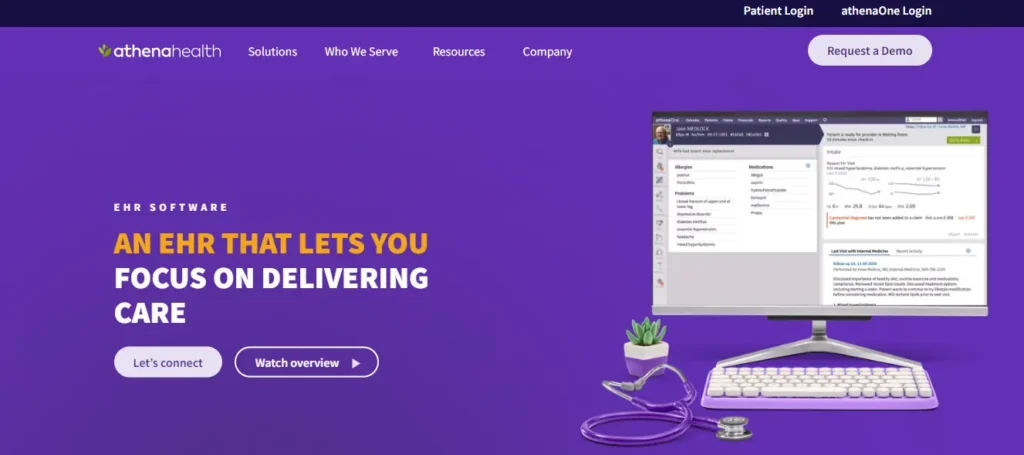
Athenahealth is a next-generation business management platform that organizes large volumes of business data and enables management to transform it into reliable and actionable business intelligence. Athenahealth is the perfect choice for medical offices trying to improve productivity and patient care.
FEATURES –
- Cloud-based accessibility: Use any internet-connected device to access EMR.
- Tools for patient engagement: Use patient portals to improve interaction and communication.
- Revenue cycle management: Use integrated technologies to simplify invoicing and payments.
- Scheduling appointments: Organize patient appointments effectively.
CONS –
- Exorbitant implementation expenses
- The difficulty of customizing
COST –
Costs vary, and complete deployment necessitates a substantial investment.
4. Allscripts EMR
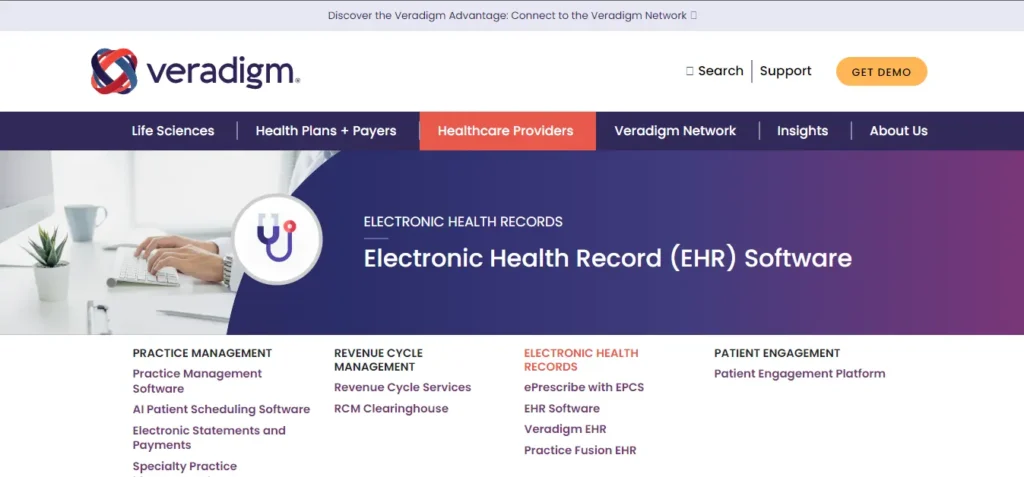
Allscripts provides both electronic medical records (EMR) and electronic health records (EHR) support and services. Allscripts is an electronic health records system designed for healthcare organizations to manage their clinical and operational needs.
FEATURES –
- Interoperability with other systems: Establish a connection to facilitate data interchange with other healthcare systems.
- Customizable templates: Modify the documentation to meet the demands of particular practices.
- Population health management: Monitor and control patient populations’ health results.
- E-prescribing: Electronic prescriptions make medication management easier.
- Mobile access: For more flexibility, use the system on mobile devices.
CONS –
- It could be expensive to deploy
- Occasional system lag reports
COST –
The cost of advanced features is extra and is determined by the size of the practice and its unique requirements.
5. NextGen Healthcare EMR

It develops and sells electronic health record (EHR) software and practice management systems to the healthcare industry. NextGen Healthcare also provides population health, financial management, and clinical solutions for medical and dental practices.
FEATURES –
- Specialty-specific templates: Pre-made templates to simplify documentation for a range of specialties.
- Integrated billing and scheduling: Use the EMR to manage appointments and finances.
- Tools for patient engagement: Reminders and portals can help with better patient communication.
- Population health analytics: To enhance results, manage and analyze patient data.
- Mobile-friendly interface: Utilize mobile devices to access and manage records.
CONS –
- Certain functionalities have a steep learning curve
- Limited alternatives for customer service
COST –
Custom Pricing
6. EClinicalWorks EMR
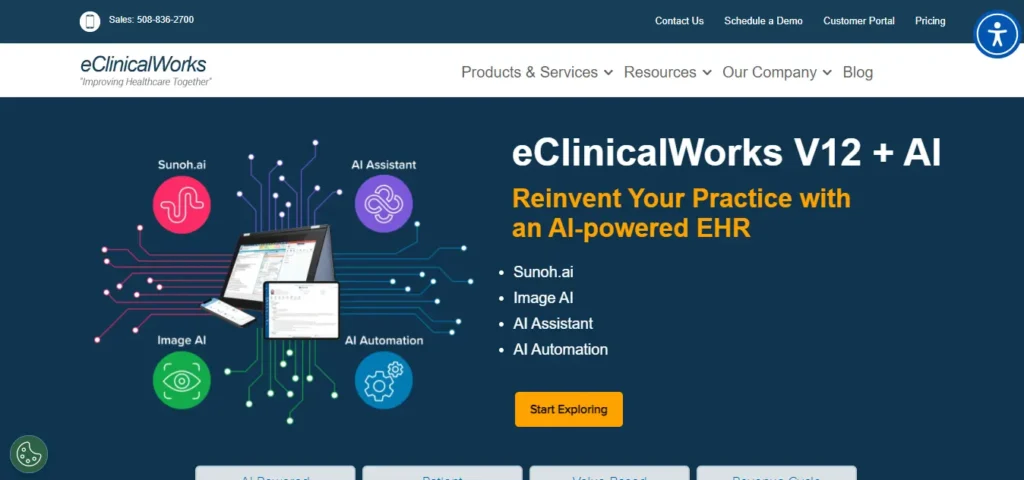
Due to its price and user-friendliness, small to medium-sized practices tend to select the cloud-based EMR system eClinicalWorks. It helps practice management and personal health record software and services to healthcare providers.
FEATURES –
- Cloud-based access: EMR data can be securely accessed from any location using cloud-based access.
- Telehealth integration: Easily carry out virtual consultations.
- Patient portal: Provide patients with communication tools and access to their medical records.
- Customizable templates: Adapt templates to the needs of your practice.
- Management of the revenue cycle: Simplify the financial and billing procedures.
CONS –
- Periodic system updates that result in outages
- Limited ability to customize
COST –
| Plan | Price |
|---|---|
| EHR Only | $449/mo |
| EHR with Practice Management | $599/mo |
| RCM as a Service | Custom pricing |
7. Kareo EMR
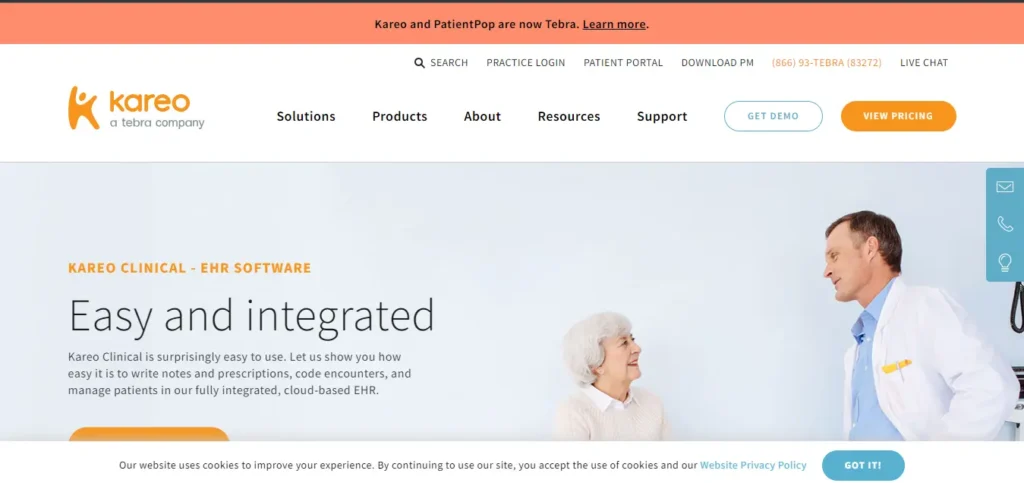
With Kareo Engage, you get automated front-office and marketing tools to help you build your brand online and connect with patients. We make it easy for patients to find you, choose you, promote you, and keep coming back.
FEATURES –
- Simple, intuitive interface: Quick to use and requires less training.
- Integrated practice management: Consolidate administrative and clinical responsibilities into a single platform.
- E-prescribing: Simplify the ordering and refilling of medications.
- Tools for patient engagement: Reminders and portals can improve communication.
- Cloud-based solution: Safely access the system from any location.
CONS –
- Fewer features than in bigger EMR systems
- Periodic problems with client service
COST –
Custom Pricing
8. Greenway Health EMR
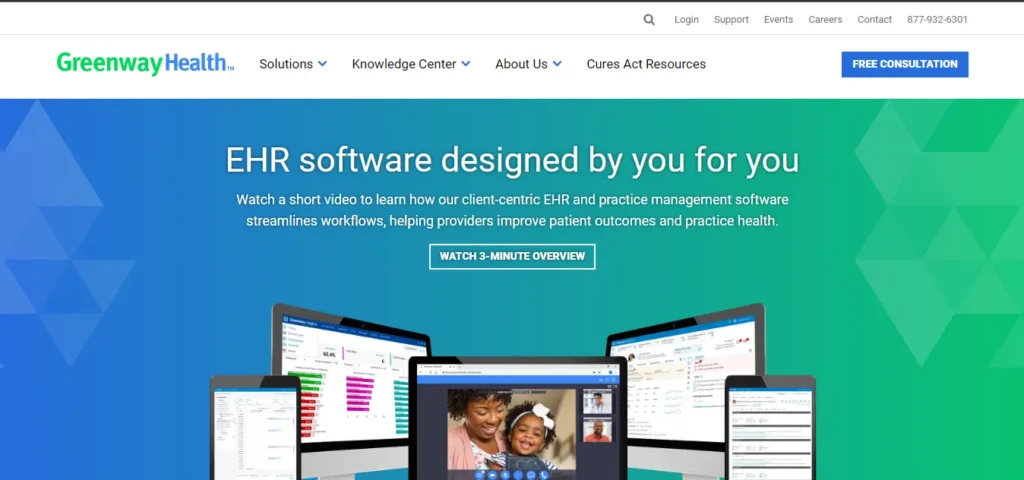
It is a healthcare technology solution designed to support medical practices with a range of features aimed at enhancing patient care, streamlining clinical workflows, and ensuring regulatory compliance.
FEATURES –
- Customizable workflows: Adjust workflows to meet the demands of certain practices.
- Revenue cycle management: Sync financial and billing procedures.
- Population health management: Track and enhance patient results at the community level.
- Patient portal: Enhance access to health information and patient communication.
- Interoperability with other systems: Make it easier for healthcare systems to share data.
CONS –
- Pricey for tiny dental offices
- Excessive acquisition curve
COST –
Custom Pricing
9. Practice Fusion EMR
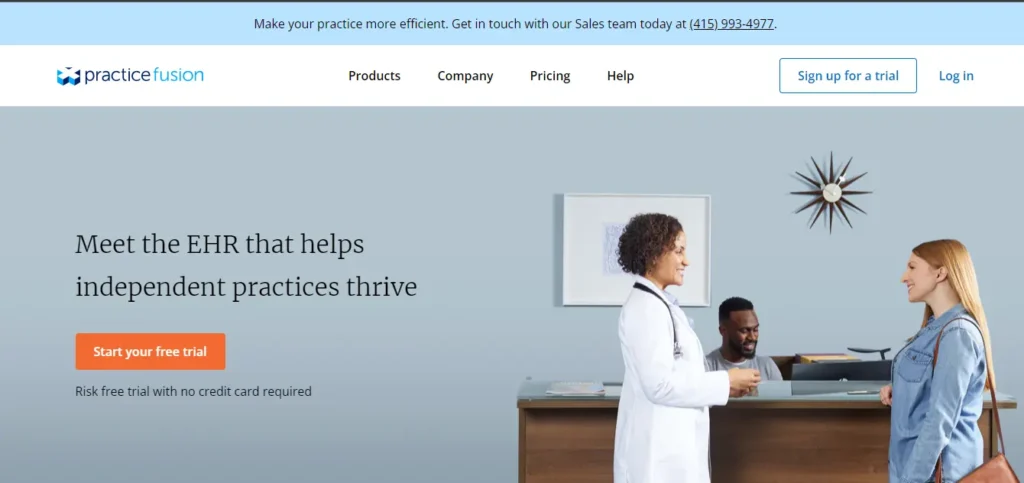
It is connections to labs and imaging centers, referrals, prescribing, document management, reporting, communication, online check-in, intake, and eligibility checks – all this saves time and improves communication between doctors and patients.
FEATURES –
- Cloud-based access: Access the system from any device with an internet connection.
- E-prescribing: Make electronic prescription administration simpler.
- Scheduling patients: Organize appointments and patient movement effectively.
- Integrated invoicing: Complete invoicing operations on the same platform.
- Customizable templates: Modify templates to meet the demands of your particular practice.
CONS –
- Few sophisticated features
- A few problems with other systems integration
COST –
$149 per provider per month
10. Meditech EMR

Meditech offers clinical charting for healthcare professionals working in midsized practices and community hospitals. It also includes Health Information Management, Revenue Cycle, Scanning and Archiving, Scheduling, and Referral Management, as well as others.
FEATURES –
- Entire clinical documentation: Gather and organize thorough patient data.
- Integrated revenue cycle management and billing: Manage finances through the EMR.
- Telehealth assistance: Enable patient care from a distance.
- Health management of the population: Enhance patient results for all demographics.
- Advanced analytics and reporting: Produce insights based on data to improve decision-making.
CONS –
- Expensive and labor-intensive to execute
- Needs extensive training
COST –
Individual pricing is according to the organization’s size; complete deployment comes at a high cost.
CONCLUSION
EMR systems are revolutionizing healthcare by replacing paper records with efficient digital solutions. They offer advanced workflows, improved communication, enhanced patient engagement, and data security. Despite initial costs and training needs, the benefits of EMRs far outweigh the hurdles. By making health information easily accessible and well-organized, EMRs are paving the way for better, more coordinated care, standing out as a crucial tool in creating a more connected and patient-centered medical experience.
FAQ’S
1. How does an EMR system help me as a patient?
EMRs make it easier for healthcare providers to access and manage your health information quickly. This means better and faster care for you. Some systems also let you view your records and communicate with your doctor online.
2. What are the Main Benefits of EMR systems?
EMRs improve organization, reduce errors, and make it easier for healthcare providers to share information. They help ensure that everyone involved in your care has the most up-to-date information.
3. Are there any Downsides to EMR systems?
While EMRs are very helpful, they can be costly to set up and require training for healthcare staff. There can also be challenges with integrating data from different systems.
4. How Secure is my Information in an EMR system?
EMR systems are designed to protect your information with strong security measures. Access is restricted to authorized users, and data is encrypted to keep it safe.
5. What is the difference between EHR and EMR?
Electronic Medical Records (EMRs) and Electronic Health Records (EHRs) are both computerized systems for maintaining patient data, but they fulfill distinct functions. EMRs are digitized versions of paper charts used in a single practice to document internal patient care. They include a medical history, diagnosis, and treatment plans, but have limited sharing capabilities outside of the practice. EHRs, on the other hand, offer a complete picture of a patient’s health across several healthcare settings. They promote improved interoperability, enabling smooth information sharing between providers and improving care coordination. In essence, EMRs manage internal records, but EHRs combine data from different providers to provide a comprehensive health perspective.
6. How does EMR technology work?
EMR technology generates a magnetic field by arranging a grid of sensors on a tablet. When you move the stylus, it interacts with this field, producing signals that control pen position, pressure, and tilt. This data is transferred to the tablet, which properly displays your strokes and mimics the feel of writing on paper.
7. What is Microsoft EMR?
Microsoft EMR stands for Electronic Medical Records, which are commonly utilized in the healthcare business. It is a digital representation of a patient’s paper chart. This system saves and manages patient health information such as diagnoses, prescriptions, allergies, immunization records, and more. Microsoft provides cloud-based platforms and solutions to assist healthcare providers in effectively implementing and managing electronic medical record systems.
8. What is the most popular EMR in the US?
Epic is the most popular EMR in the US, especially for hospitals. Other major EMRs include Cerner, Allscripts, and eClinicalWorks.



